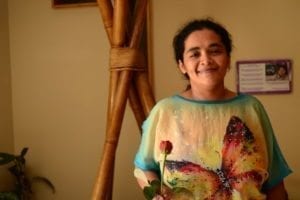We all have the right to be treated equally. Governments have a moral and legal obligation to protect people from discrimination or violence based on who they are.
When governments fail to protect people, Amnesty International is there – helping ensure that all people can live in dignity, safety, and freedom.
The Problem
All over the world, including in the United States, people face discrimination, inequality, and violence based on who they are.
When people face these abuses, their ability to be safe, work, receive health care, get an education, start families, and pursue their goals in life are jeopardized.
- Women experience violence and discrimination based on their sex and gender.
- Sexual and reproductive rights are under increased threat in the U.S. and around the world.
- LGBT people are harassed, discriminated against, and attacked because of their sexual orientation or gender identity.
- Indigenous people have faced human rights abuses for generations, and today they continue to be denied justice in protecting their land and water, holding perpetrators of sexual assault accountable, and other areas.
Amnesty In Action
Changing lives and policies
Amnesty International conducts research, provides training, and advocates for reform to advance equality and safety. We’ve helped change federal laws on violence against women and Indigenous sexual assault survivors’ access to care and justice, and we’ve helped repeal laws globally that criminalize abortion.
- We conducted groundbreaking research on the high rates of rape and lack of care and justice for Native sexual assault survivors, and now we’re working to strengthen protections that our report helped spark. Take action to ensure that Native women have equal access to post-rape care.
- Abuse is running rampant on Twitter, making it a toxic place, particularly for women. Tell Twitter’s CEO: Tackle Abuse on Twitter Now. You can also sign up for our Troll Patrol here.
- Help stop violence against women globally: urge Congress to Pass the International Violence Against Women Act. More info at www.amnestyusa.org/IVAWAaction
- Tell Congress to End the Deadly Global Gag Rule
- Amnesty youth advocate trainers hold trainings across the country on knowing and claiming our sexual and reproductive rights. Email [email protected] for more information and to request a trainer in your community.
- We provide research and campaign on ensuring LGBTI people can enjoy their human rights. Take part in Pride actions.
- For Amnesty International’s actions, letters and press statements on Standing Rock, visit www.amnestyusa.org/standing-rock/
Statistics
76
Number of countries that criminalize sexual activity between adults of the same sex.
338
Number of restrictions on abortion that have been enacted in the U.S. since 2010, according to the Guttmacher Institute.
435
Number of advocates trained by Amnesty International USA to protect sexual and reproductive rights.




